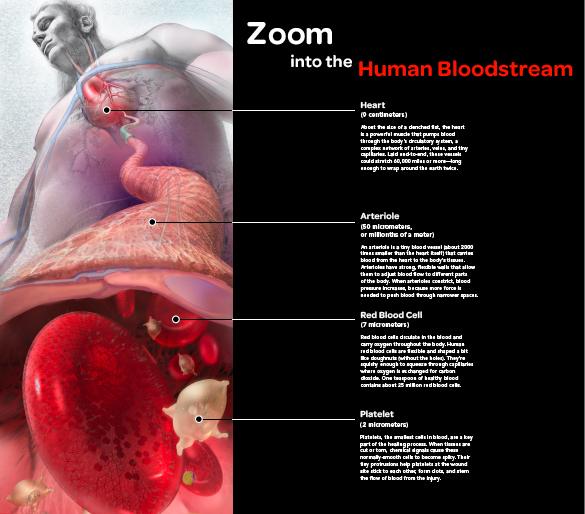DESCRIPTION
This illustration shows the circulatory system across 10 orders of magnitude. Using the conventions of visual perspective the image travels in one continuous "landscape" from the human scale at the top to the atomic scale in the foreground. Placing objects from the circulatory system in one frame clarifies the connections between components, highlighting the system’s reliance on structures at very different scales. This illustration won the 2008 Science and Engineering Visualization Challenge from NSF and Science magazine! This illustration is available as a poster with annotated text, a banner, a poster without annotations or a graphic file, and also appears on the "Everything is Made of Atoms" Poster with other parallel zooms into a butterfly wing and a computer chip.
DESCRIPTION
This illustration shows the circulatory system across 10 orders of magnitude. Using the conventions of visual perspective the image travels in one continuous "landscape" from the human scale at the top to the atomic scale in the foreground. Placing objects from the circulatory system in one frame clarifies the connections between components, highlighting the system’s reliance on structures at very different scales. This illustration won the 2008 Science and Engineering Visualization Challenge from NSF and Science magazine! This illustration is available as a poster with annotated text, a banner, a poster without annotations or a graphic file, and also appears on the "Everything is Made of Atoms" Poster with other parallel zooms into a butterfly wing and a computer chip.
OBJECTIVES
LEARNING GOALS
• The human circulatory systems is made up of structures at many size-scales. • These structures range from the size of the whole body to the size of molecules that are unique to the circulatory system.
NANO CONTENT MAP
Nanometer-sized things are very small, and often behave differently than larger things do.
Scientists and engineers have formed the interdisciplinary field of nanotechnology by investigating properties and manipulating matter at the nanoscale.
DOWNLOAD FILES
- Zoom Into the Human Bloodstream Illustration (Small) (JPG)
- Zoom Into the Human Bloodstream Illustration (Medium) (JPG)
- Zoom Into the Human Bloodstream Illustration (Large) (JPG)
- Zoom Into the Human Bloodstream Annotated Poster (GIF)
- Zoom Into the Human Bloodstream Annotated Poster (PDF)
- Zoom into the Human Bloodstream Annotated Poster (Print Quality) (PDF)
- Formative evaluation of the Zoom into the Human Bloodstream & Butterfly illustrations (PDF)
- Zoom Into the Human Bloodstream Annotated Poster (Spanish) (PDF)
Credits
Exploratorium
Developed for the NISE Network with funding from the National Science Foundation under Award Numbers 0532536 and 0940143. Any opinions, findings, and conclusions or recommendations expressed in this product are those of the authors and do not necessarily reflect the views of the Foundation.
Creative Commons Attribution Non-Commercial Share Alike 3.0 United States (CC BY-NC-SA 3.0 US).
View more details

NISE Network products are developed through an iterative collaborative process that includes scientific review, peer review, and visitor evaluation in accordance with an inclusive audiences approach. Products are designed to be easily edited and adapted for different audiences under a Creative Commons Attribution Non-Commercial Share Alike license. To learn more, visit our Development Process page.


